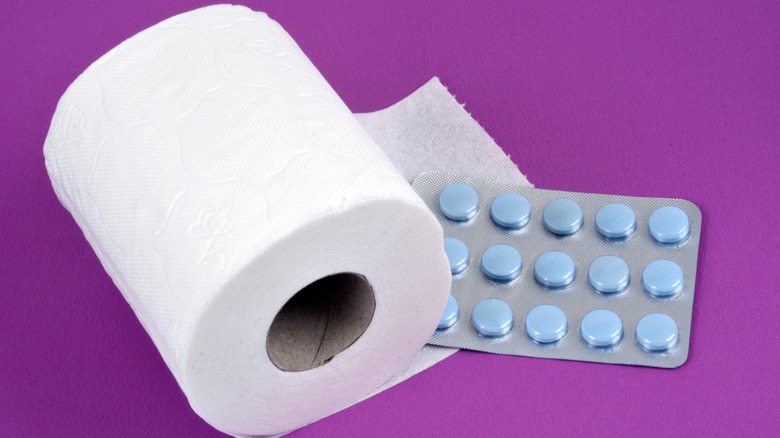What Taking Laxatives Every Day Does To Your Body
Chronic constipation can make you feel bloated and nauseous, but that doesn't necessarily mean you should take a laxative every day. These medications don't address the underlying cause of constipation — they only offer temporary relief (via WebMD). Plus, they have the potential for misuse and dependence.
Despite what you may have heard, laxatives won't help with weight loss either. Clinical research shows that about 10 to 60% of individuals who suffer from eating disorders abuse or misuse these products. However, most calories and nutrients are absorbed in the small intestine by the time laxatives act on the large bowel. These drugs stimulate peristalsis, or gastrointestinal motility, but they don't push food through your body quickly enough to prevent calories from being absorbed. Any weight loss resulting from laxative use is most likely due to fluid loss, according to the National Eating Disorders Association (NEDA). Laxative abuse is also common among the elderly, athletes, and individuals with factitious disorders, reported the journal Drugs. In any case, laxatives can do more harm than good, as we'll discuss.
If you are struggling with an eating disorder, or know someone who is, help is available. Visit the National Eating Disorders Association website or contact NEDA's Live Helpline at 1-800-931-2237. You can also receive 24/7 Crisis Support via text (send NEDA to 741-741).
Taking laxatives every day may actually worsen constipation
Medical guidelines define constipation as infrequent bowel movements, small or hard stools, or a feeling of incomplete emptying (via Johns Hopkins Medicine). Its causes range from low fiber intake to slow transit, nerve damage, or weak pelvic muscles.
Laxatives can temporarily relieve constipation, but they're typically not intended for prolonged use. Some work by drawing water in the large intestine and adding bulk to the stool. Others stimulate peristalsis, increasing the frequency of bowel movements. However, bulk-forming laxatives, such as psyllium, are safe to use daily, says Harvard Medical School. Stool softeners, on the other hand, can affect nutrient absorption and shouldn't be used for more than a few days. The same goes for stimulant and osmotic laxatives.
As Dr. Jacqueline Wolf told Harvard Medical School, "When bowel movements are slow, some people really do need stimulant laxatives." The problem is that overusing these drugs can affect bowel function. Over time, you could become dependent on them to go number two. "It's really no different than someone struggling with drug addiction or alcohol addiction — the person's tolerance gets greater and greater," Tanja Haaland, clinical director of the Meadows Ranch, told Yahoo.
Laxatives can deplete your body of electrolytes and water
Taking laxatives every day can lead to fluid and electrolyte imbalances, says NEDA. Magnesium, sodium, calcium, and other electrolytes regulate physiological processes, such as nerve function, muscle contractions, and bone formation. Your body needs these nutrients to sustain itself and function optimally. When this delicate balance is disturbed, you may experience fatigue, headaches, dizziness, arrhythmia, muscle cramps, or constipation. In severe cases, electrolyte imbalances can lead to coma or even death, warned Verywell Health.
Laxative overuse may also cause dehydration. These medications trigger diarrhea, which can lead to fluid loss. When you lose water, you lose minerals and electrolytes too. Even mild dehydration can affect attention, reaction time, mental focus, and cognition (via NPR). Dehydration may also cause low blood pressure, fatigue, confusion, sugar cravings, dry mouth, and chills, noted the Cleveland Clinic. It's also a common cause of constipation, as your body needs water to break down food and move it through the digestive tract. Barnard College warns that laxative abuse or misuse can lead to death from dehydration and organ damage.
Laxative overuse may affect colon function and gut health
When used regularly, laxatives can affect the intestinal mucus and leave your colon vulnerable to infections (via Barnard College). The intestinal mucus acts as a barrier against bacteria and other pathogens, such as H. pylori and salmonella. Due to its protective action, it inhibits inflammation and infection, a report in Current Opinion in Microbiology explained.
Taking laxatives every day can also result in diarrhea and loose stools. Even a short bout of diarrhea can throw your gut out of whack. A 2011 review published in the journal Cell explained that mild osmotic diarrhea — a common side effect of laxatives — may cause "lasting changes" to the gut flora and affect immune function.
Laxative overuse has also been linked to a higher risk of bowel tumors. According to the Canadian Society for Gastrointestinal Research, it can also increase your risk for pancreatitis and intestinal paralysis. Since these drugs disrupt the gut flora, they may also cause or worsen irritable bowel syndrome. Both over-the-counter and prescription laxatives carry health risks. The best thing you can do is to prevent constipation in the first place. Small things, such as filling up on fiber and drinking more water, can make a big difference. If those things do not help, be sure to consult your doctor.




